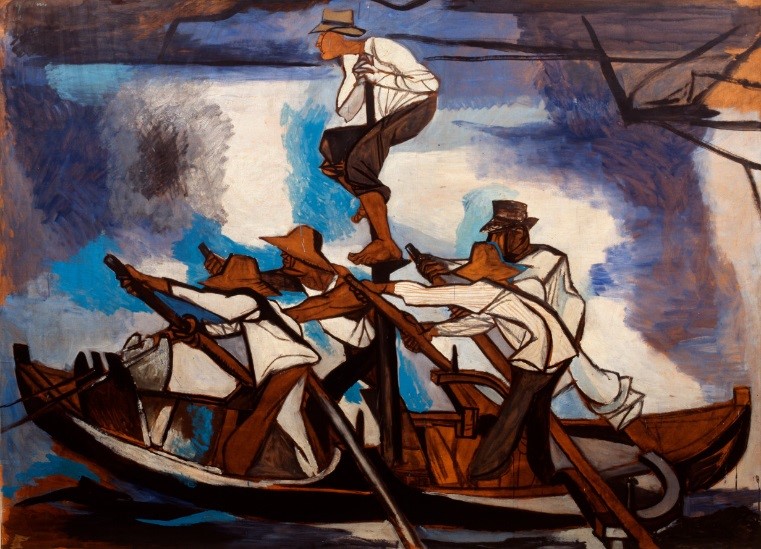
Learning the details: when honoring the past liberates the creativity in the present.
By Antonio Sama
Image credit (“Pesca del pescespada a Scilla” (1949) by Renato Guttuso)
how the archive inspired a new relationship with my mentor.
I was invited recently to contribute to a collective book in memory of my late mentor and friend Professor Giovanni Mastroianni, who died in August 2016. This was intended as a collection of memories from his students from his native city Catanzaro (in Calabria, Southern Italy). I was asked for a fifteen page chapter narrating and explaining the role and influence he and his teaching had on my personal and professional development. Among the various avenues (personal memories, key facts in our relationship, key learning on my part etc.) at my disposal for engaging with this request I found that a fit (and for me, perhaps, safer?) tribute would be to explore and expand the implication of his teaching in my current professional identity as an academic (Senior Lecturer in Management and Leadership) and an organisational consultant (rooted in the Tavistock’s traditions). This was a natural and appropriate area of reflection and enquiry for my contribution to the Tavistock Institute Archive project and to the AOM symposium, led by Jean Neumann, on opening the Archive. The question that guided my writing (aligned with some of the work of the Archive Group and my joint reflection and enquiries with Jean and Juliet Scott) was “How can I translate (customize?) his teaching and influence on my contribution to the Archive Project and its various spin offs?”. This question immediately made my article another of the Archive Project spin offs.
In the paper Juliet and I prepared for the AOM symposium (“A Polyphonic Dialogue with the TIHR Archive: Working with the Past, Present and Future as Organisational Development and Customization of TIHR traditions) I engaged with some of Bakhtin’s concepts in order to explore and understand what we did with the history of the Institute and how we, as a pair, and the larger community of Tavistockians created meaningful dialogues with it. I found that the concept of “polyphony” was very appropriate and allowed for meaning to be constructed, a working hypothesis to be generated and a course of actions to be tested. In doing so I was applying (“translating”, “using”, and “importing”) a concept Bakhtin generated to understand and explain the innovation Dostoevsky developed for the western novel to a case of organisational intervention. I have to thank Juliet for seeing a role of this thinking in our work and agreeing to it.
At the symposium the dialogical view point, as well as others from other colleagues presenting, attracted some interest and questions were asked. The focus of these questions, and the Bakhtin’s work that was quoted, left me with the impression (and feeling) that only one part of the Russian scholar legacy was brought in the room. It was the Bakhtin “literature and cultural scholar” with no reference to the other Bakhtin: the ethical philosopher. I was left with the question “Is there a predominant and accepted approach to Bakhtin’s work in organisational discourse that includes only a part of his legacy and that can be deemed incomplete?”
My mentor had studied the “Bakhtin’s questions” since the mid-1990s and was among the most respected Italian scholars on the matter. From my mentor I learned to appreciate the study of details and its importance in understanding the origin of ideas and the history of the philosophical legacy of scholars. What more than a fitter tribute would be to explore when, how and what Bakhtin entered the discourse of organisational studies and intervention? My chapter was thus written and given to the editors; its title is Noterelle per un (in)certo Bachtin negli studi organizzativi (con un’appendice personale) [Short notes for a (un)certain Bakhtin in organisational studies (with a personal appendix)].
Here I would like to share the two quotations that open the chapter:
| “A dwarf standing on the shoulder
of a giant may see farther than a giant himself” Burton, Anatomy of Melancholy
|
Someone calls to me from Seir,
“Watchman, what is left of the night? Watchman, what is left of the night?” The watchman replies, “Morning is coming, but also the night. If you would ask, then ask; and come back yet again.” Isaiah (21, 11-12)
|
The next ‘shamelessly’ Practical Seminar on 17 January will be an exposition and exploration of what it means to practically work with the impact and the dynamics of history when consulting with organisations or designing a change project.
If you have any questions about the seminar, please contact Anabel Navarro, Professional Development Executive Assistant: a.navarro@tavinstitute.org